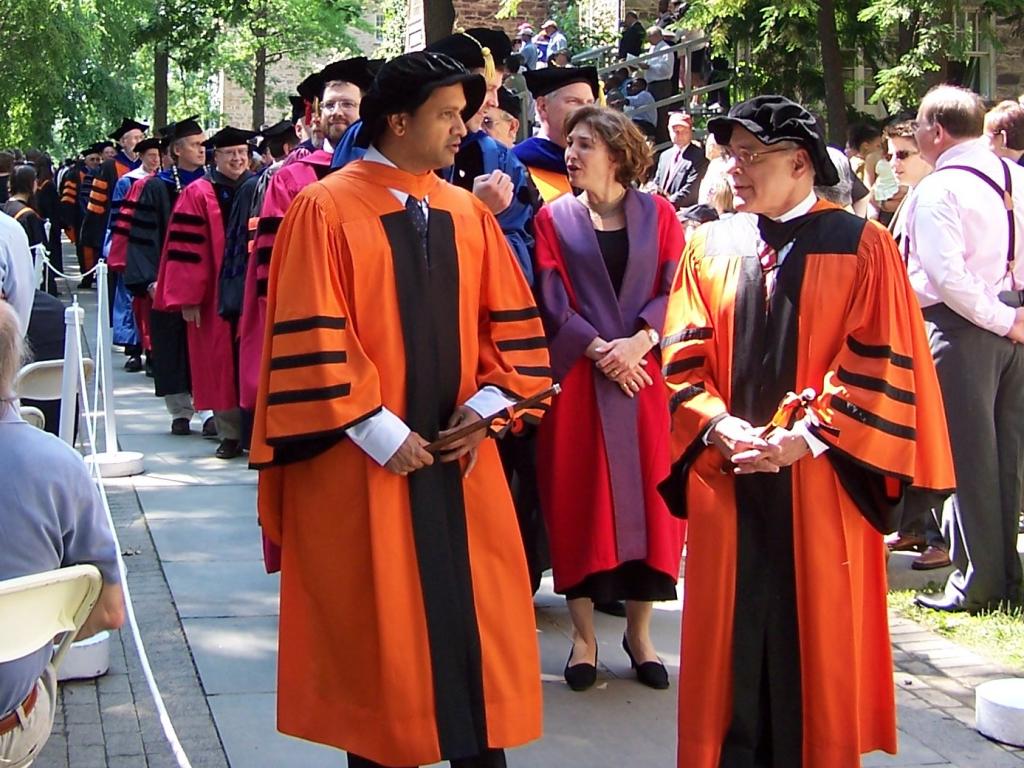
So there was a dust-up over the weekend about a Wall Street Journal opinion piece criticizing Jill Biden and her supporters for her/their wish/demand/insistence that she be called “Dr. Jill Biden,” because of her academic degree.
Is Jill Biden a doctor?
Not in the ordinary American usage of the term.
Does she merit being addressed with the title, “Dr. Biden”?
Under some circumstances, by some people, yes.
Is that customary usage actually reasonable?
No, not really.
Let’s start from the beginning: with the Doctor of Education.
Here’s Wikipedia:
In January 2007, at age 55, she received a Doctor of Education in educational leadership from the University of Delaware. Her dissertation, Student Retention at the Community College: Meeting Students’ Needs, was published under the name Jill Jacobs-Biden.
What’s a “doctor of education”? It is not, in fact, a Ph.D. It is what’s called a “professional doctorate,” an invention, it appears, of the American education system, as a way to grant a credential more advanced than “master” without the rigorous study and the dissertation requirement of a Ph.D. And in this respect, the Wikipedia article is incorrect; Biden did not write a dissertation but what she herself, in the work itself, calls an “executive position paper.” (Here’s a link to read it.) The paper is longer than a typical college “term paper” but not at the level of a true dissertation; the individual on twitter who found a non-paywalled link to the document read it and observes that, in addition to the overall weakness of the research (consisting of surveys and interviews at one community college) there are instances of math errors and proofreading lapses. In total, the paper amounts to 136 pages, of which only 40 are research, with the remainder a review of literature, documentation of the interviews, etc.
According to the applicable Wikipedia article, the Doctor of Education was established first at Harvard in 1921 and its purpose was to give students the ability to advance in their careers in teaching, rather than prepare them for academic careers. This degree exists in only a small number of other countries outside the US, all a part of the Anglosphere; in at least some of those countries, it is made clear that the EdD is exactly as rigorous as the Ph.D.
Another indicator of the degree of rigor is this: the “doctor of education” takes far less time to complete than a Ph.D. Biden’s own program was a 3 – 4 year part-time program. For other examples, see Online EdD Programs which states this is 3 years of full-time study; USC Rossier, which considers the three year requirement to be on a part-time basis — “completed while you work”; Teach dot com, which reports a completion time of two years; and Franklin University reports a duration of 2 years full-time, or four years or more part-time.
A Ph.D., of course, can be expected to take 5 or more years.
And the “doctor of education” is not the only “professional doctorate.”
In the same manner as one can obtain an MBA, there’s an option of a DBA, a doctor of business administration. In this case, Wikipedia gives no history of the degree. But, again, the program bears little resemblance to the rigor and learning of a Ph.D. At DePaul, for instance, it’s marketed as a three-year part-time program. At Concordia University, the part-time-ness isn’t explicitly stated but appears to be assumed as students take one class at a time for 9 semesters (it appears one studies continuously without summer breaks).
Is it reasonable to expect that someone who successfully completes one of these programs be addressed by the title “Dr.”? These program’s promoters certainly believe so, and I can well believe that, within the education field, enough people have a vested interest in maintaining the belief that the Ed.D. is equivalent to the Ph.D. and a demonstration of superior scholarly achievement, that they maintain this practice in that environment. I have a hard time believing that a business executive who completed a DBA program would use that title or expect others to do so, except perhaps within the academic field.
But — for the purposes of discussion — what if Biden had earned a Ph.D.? Would it be appropriate for her to insist (or for others to insist, on her behalf) that she be accorded this title?
If this was within the context of reporting on research she had achieved, sure. If this is with respect to her role as the spouse of the president, or some particular activity within the campaign, or any activity she had independently pursued, not really. And that rule is, in fact, applied fairly consistently: no one in the media reported on Dr. Condi Rice, Dr. Newt Gingrich, Dr. Lynne Cheney, etc., and, so far as I know, none of these individuals took offense at this, nor did anyone do so on their behalf.
Would it be a different story in, say, Germany? Yes, of course. In that country, “Doktor” is a title accorded to those with a Ph.D. In contrast to the United States, where, in my own profession, actuaries who had previously earned doctorates dropped that, even in the form of the “Ph.D.” initials in their signature, when they left academia for the business world, in Germany, those who had earned doctorates are addressed as such consistently, and there were multiple such individuals among my contacts in the German office of my employer. (Well, OK, by convention, they were addressed by first names as colleagues, but they would have been addressed that way by clients.) It’s also the case in Germany that titles stack: an individual who had earned two doctorates and was now a professor would be “Professor Dr. Dr. so-and-so.” Without the professorship, it would be “Frau Dr. Dr. so-and-so.”
And here we need to talk about language and formality:
After all, in German, the word for medical doctor is different than that of “person with a Ph.D.” — the former is Arzt. In French, it’s médecin vs. docteur. In Latin, medicus vs. doctor. In English, we have, here as in many other similar cases, two such words: doctor and physician. The usage of doctor in the sense of physician dates back to 1377, according to the OED (a screen-shot shared by twitter), though the usages that they cite that are most unmistakably of this sort date only to Shakespeare; the word physician dates back further, coming from the French. According to the Online Etymological Dictionary,
The sense of “medical professional, person duly licensed to practice medicine” (replacing native leech (n.2)) grew gradually out of this from c., 1400, though this use of the word was not common until late 16c. The transitional stage is exemplified in Chaucer’s Doctor of phesike (Latin physica came to be used extensively in Medieval Latin for medicina).
That no man … practyse in Fisyk … but he be Bacheler or Doctour of Fisyk, havynge Lettres testimonyalx sufficeantz of on of those degrees of the Universite. [Rolls of Parliament, 1421]Middle English also used medicin for “a medical doctor” (mid-15c.), from French. Similar usage of the equivalent of doctor is colloquial in most European languages: Italian dottore, French docteur, German doktor, Lithuanian daktaras, though these typically are not the main word in those languages for a medical healer.
Now, why it is that in English, we didn’t hold onto the Old English word leech, isn’t clear. The answer floating around twitter is that physicians appropriated the word “doctor” for their own purposes, to emphasize their qualifications, but that doesn’t explain why this would have happened in English but not in other languages. Presumably the fact that English was busily evolving in so many ways, and so many Old English words were being supplanted, produced this outcome in English but not elsewhere. According to that site, incidentally, it is conventionally believed that “leech” to refer to the bloodsucking worm originated from “leech” as a physician, but they may simply have been homonyms.
At the same time, etymology and multilingual comparisons can explain how we got where we are, but it does not have any power to compel anything. Regardless of what other countries do, regardless of the history of the word, in the United States, the primary meaning of “doctor” is “medical professional,” and “individual with a Ph.D.” is a secondary meaning which should generally be avoided due to the possibility of confusion. And we customarily use the title “Dr.” to refer to medical practitioners to show respect and deference for their expertise in the field of medicine, not to honor them for the extensiveness of study and expertise in any field, in the same manner as we use the honorific of “Rev.” for those who have been ordained by their religious communities, not as a marker of extensive academic study and attainment.
But what about academia and misogyny?
It is true that women within academia have objected regularly of being treated in a manner that’s inconsistent with their male colleagues. They voice complaints (for example, on twitter), that students are more likely to address them as Professor so-and-so while they address male faculty as “Dr. so-and-so.” They view this as a sign of disrespect.
Are they coming to Biden’s defense because they are responding to this sense of mistreatment in academia? Presumably that is part of their motivation. And I have no means of assessing whether they are correct in this behavior on the part of students. I don’t actually recall addressing any of my professors by the title of “Dr.” in either college or grad school, but, then again, let’s face it, it was a long time ago. (I do recall that one professor took the approach of addressing each of us as “Mr.” or “Mrs.” so-and-so to give each of us the same level of “using titles to show respect” as professors were accorded, and some students were a bit disconcerted — “how will we know what each other’s first names are?” “why don’t you just ask?”)
But is this germane to the debate of the use of honorifics outside of academia?
No.
I see no indication that there is any such differential treatment of men and women. Some individuals with doctorates, for idiosyncratic reasons, have been called “dr.” — for example, I believe Henry Kissinger was called “Dr. Kissinger.” It makes sense that Dr. Martin Luther King, Jr.’s title was emphasized to prod his critics to accord him respect.
Is any of this worth spending time on?
Yes and no. It does appear to be a giant waste of time to argue against Biden’s use of the title. If she wants to put “Dr. Jill Biden” in her twitter bio, what does it matter?
But it does matter if the “pro-doctor” side insists that one is obliged to refer to her as “Dr. Jill Biden” or “Dr. Biden,” or if, indeed, they attempt to force a new usage of language and insist that, despite trends toward less and less formality, individuals with degrees conferred on them which are labelled by the conferring body as “doctorate,” must in all cases be addressed with this title or the speaker has been disrespectful or, regarding a woman, misogynist.
What’s more, one could make a case that the practice of insisting on the “Dr.” usage actively does harm, by encouraging the proliferation of credentials. Again, 3 years of part-time study and an extra-long term paper are enough to lay claim to the title of “Dr.” — and not as a replacement for Ms. or Mr. but as an add-on even in circumstances in which we have long since abandoned the usage of Mr. or Ms. for everyone else. And the same people who call for student loan forgiveness and “free college!” seem to be quite OK with ever-ratcheting demands for the amount of education people are expected to have.












